'It's got to be stopped' - why are people getting fly-tipping penalties?
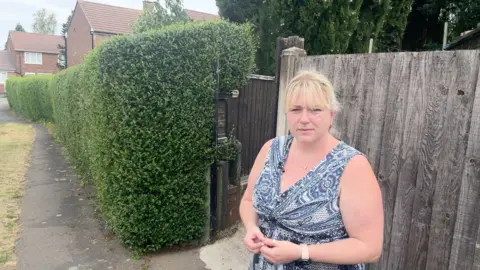 BBC
BBCWhen Anna Gilkinson's garden bench broke, she thought she would be helping the environment by putting it out for the scrap man to collect and recycle.
She never expected to have two uniformed officers come to her home and accuse her of fly-tipping, then receive a letter demanding £500.
"I was in shock," Anna said. "It was sat outside for 24 hours, maybe 48 hours at the most, and the scrap man was on his way here to collect it."
Anna is one of numerous people to receive fixed penalty notices (FPNs) for alleged fly-tipping from a private enforcement company called Waste Investigations Support and Enforcement (WISE).
The company says it works with more than 40 councils across England, including in Broxtowe Borough Council in Nottinghamshire, where Anna lives.
WISE makes money by issuing FPNs, because the local authorities allow it to keep a percentage of whatever people pay.
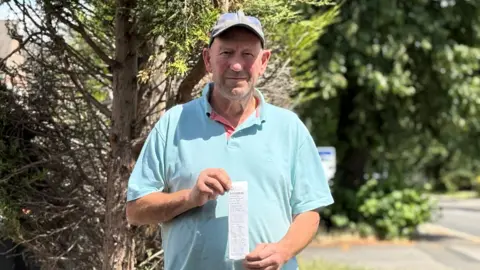
WISE began a 12-month trial in Broxtowe in April, and residents there have already been complaining that they feel they have been unfairly accused of fly-tipping.
They include Frank Brown, who said he had been asked to pay £500 because he left two bags of sand - which he was still using - on a grass verge in Chilwell.
Frank's FPN has now been cancelled following publicity about his case this week, but he is concerned other people are being "bullied" into paying.
"I think it's outrageous; it's definitely got to be stopped," said Frank.
Other cases include a man in nearby Bramcote, who was asked to pay £1,000 because he left a bag of garden waste on a grass verge before taking it to the tip.
Adam Castledine said his encounter with the WISE officers was "baffling".
"They seemed a bit heavy-handed for a bag of garden waste," he said. "You would think it was nuclear waste the way things were going on."
So why are people receiving these demands for money, and what should people do?
What does WISE do?
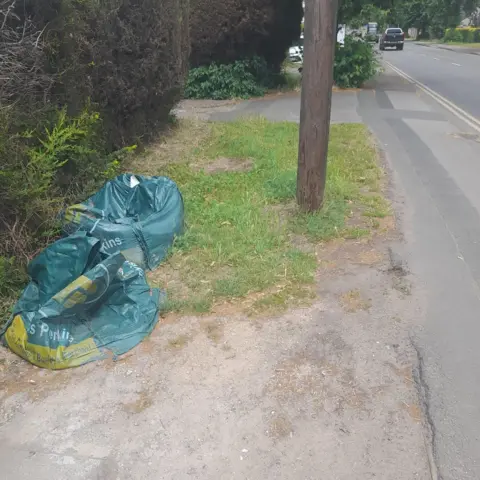 Frank Brown
Frank BrownWISE is a private company, which works with councils across England to enforce environmental and anti-social behaviour offences, including littering, dog fouling, fly-tipping and fly-posting.
Offences like these were traditionally enforced by council staff, but some authorities now use contractors such as WISE in order to save money.
On its website, WISE says it offers its services using a "cost-neutral model", which means the council does not have to pay anything.
Instead, WISE makes money by retaining some of the revenue from FPNs.
On its website, it claims to have "an impressive 79% payment rate".
Is it an offence to leave out scrap?
Anna said she had left her broken bench on a pavement next to her garden gate.
She said her husband had arranged for a scrap man to collect it - and the scrap man has confirmed to the BBC that this was the case.
However, two WISE officers spotted the bench before the scrap man had a chance to pick it up. Anna was not at home when the officers knocked on her door, so they initially spoke to her mother.
"They said they were placing her under caution for fly-tipping and she had to pay a £500 fine," said Anna.
"My mum felt very intimidated, she didn't know who these people were."
Anna then returned home and spoke to the WISE officers herself, along with the scrap man and his colleague, who had arrived to collect the bench.
In a video filmed by the scrap man, he told the WISE officers he had put the bench in his truck and was taking it away. But despite this, Anna received a £500 FPN in the post accusing her of fly-tipping.
Michael Orlik, a solicitor who specialises in highways, said temporarily leaving scrap on a pavement could be an offence under the Environmental Protection Act 1990.
"The legislation does not say that the waste can be left in the street, for however short a period," he said.
However, he said the fine would likely be very small if someone were to be convicted in court.
"I think that the magistrates would impose a nominal fine, but this has to be speculation," he said.
Is leaving garden waste on a verge illegal?
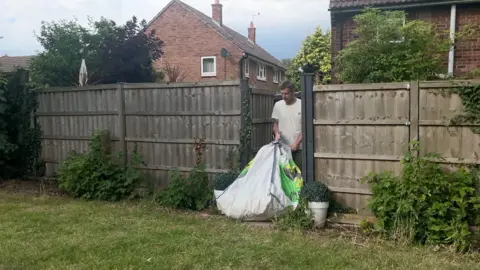
Adam left a bag of garden waste on a grass verge next to his back gate.
He said he had planned to take it to the tip but the bag was too heavy to lift into his car, so he was waiting for a neighbour to help him.
It had been there for a day and a half when two WISE officers knocked at his door.
"They were almost like doormen-type people, just going on about all these laws, saying I could be in a lot of trouble," said Adam.
Adam said he asked if they could help him lift the bag into his car, but they declined, so he dragged it back into his garden.
The officers returned the following day, when there was nobody at home, then again the day after, when they issued Adam's wife with a £1,000 fixed penalty notice for fly-tipping.
"I can't see how it's fly-tipping," Adam said. "I get clamping down on fly-tipping when people are dumping beer bottles and mattresses and stuff, but that just seems ludicrous."
Michael Orlik said temporarily leaving a bag of garden waste on a verge could be an offence under the Environmental Protection Act 1990.
However, he said the fine would likely be nominal if the case went to court.
Can people challenge the FPNs?
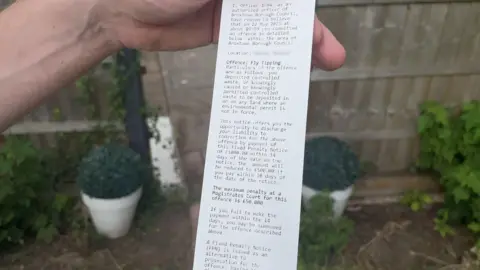
FPNs are sometimes referred to as "fines", but they are intended to be an alternative to prosecution for minor offences.
They offer people the option of paying the fixed penalty, and therefore discharging their liability for the offence, rather than being taken to court and potentially getting a criminal record.
People can appeal against their FPNs by contacting WISE, but Anna said she had had difficulties getting a response.
"I've tried several times to ring them, couldn't get through to anybody, I got an answer machine telling me that their message box was full and couldn't take any more messages," she said.
She emailed WISE but said it had taken eight days for anyone to respond.
"I received a response to the email telling me they want proof it was a booked-in scrap collection, proof of the scrap man's licences and all the paperwork, which I don't have," she said.
"You don't get a receipt for a scrap collection, most people just leave it outside."
People can ultimately challenge FPNs by not paying them and waiting to see if they get taken to court.
However, the fly-tipping FPNs issued by WISE warn people: "The maximum penalty at a magistrates court for this offence is £50,000."
This has worried Adam, who does not know what to do.
He said: "I assume it's going to have to be paid or fought in court, but if a judge gets out the wrong side of bed and sides with them, who has got £50,000?"
However, Michael Orlik said the wording on the FPNs was misleading,
"The notice says that the maximum fine is £50,000, which is correct, but that sort of fine would not be imposed by a court for a minor offence," he said.
"The notice is intended to intimidate people into paying up. It should say that the maximum fine in the most serious cases is £50,000."
What has WISE said?
The BBC contacted both Broxtowe Borough Council and WISE, and a joint statement was issued in response.
It said the council had partnered with the environmental enforcement agency "to deal with fly-tipping and littering across the borough".
"This collaborative effort is in direct response to feedback from residents during the annual budget consultation process, highlighting concerns over declining street cleanliness," it added.
"Despite previous initiatives focused on education and community engagement, the council recognised that more targeted action is necessary to maintain the cleanliness of the borough."
The BBC asked how the money from the FPNs was split.
In response, the statement said: "The financial information contained within the contract is commercially sensitive information and therefore, we are unable to disclose this information."
On appeals against FPNs, the statement added: "If residents are dissatisfied with the decision, they can submit a representation through WISE and ask that the council review.
"This challenge will then be reviewed by senior officers at the council."
The statement said the council and WISE were unable to comment on individual cases.
"However, the council remains committed to listening to feedback from residents throughout the trial period of the arrangement, which will be reviewed after 12 months," they added.
Follow BBC Nottingham on Facebook, on X, or on Instagram. Send your story ideas to [email protected] or via WhatsApp on 0808 100 2210.
